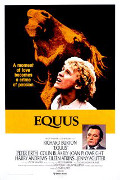
Directed by
Sidney Lumet
137 minutes
Rated M
Reviewed by
Bernard Hemingway

Equus
Peter Shaffer’s hit stage play is engrossing, exhausting and slightly ridiculous in equal measure. Richard Burton plays Martin Dysart, a child psychiatrist who works in a facility in Hampshire for troubled youths who finds himself drawn into the case of Alan Strang (Peter Firth) a teenager who has blinded six horses in a senseless attack.
Apparently part of the success of the theatrical production of Shaffer's play was in the highly stylized staging. Which makes sense as Sidney Lumet’s transposition to a more naturalistic setting tends to throw the material into question. Burton ‘s Dysart hardly strikes one as any kind of psychiatrist as he is wont to yell at his patients and anyone else who frustrates him while on his conveniently detective-like investigatory outings. Then there’s the pot-boiler psychology with Alan’s manically religious mother (Joan Plowright), a transference of Alan’s libidinal energy from the image of Jesus to the image of a horse (a rather obvious symbol of phallic virility) mixed up with Christological fear-mongering and Dysart’s own identification with the lad as exemplifying the life-affirming passion that he (i.e. Dysart) only talks about but never comes so close to experiencing. One can, at a push, understand how all this would have worked on the stage but it doesn’t convince in a real world setting. Passion, shmassion, the kid wants to have sex with a horse for Chrissakes!!
Shaffer’s text (he also wrote the screenplay) is often floridly excessive but Burton, who at the time was best known for squandering his talent on formulaic pay-check films, tackles it with true thespian vigour endowing it with Shakespearean gravitas that manages to sweep aside the implausibilities. Although too old to play a 17 year-old Firth, who had played the character on stage opposite a number of different Dysarts including Burton and before him, Anthony Hopkins, gives a bravely physical performance (including a degree of full-frontal nudity which is unusual even by today’s standards) although despite the early promise that his character is "extraordinary" he's really just pathetically mixed up and not particularly interesting,
Lumet packages the whole thing well enough, most effectively when he heightens the mood with theatrical touches such as the night-riding scene, the sex scene with Firth and Jenny Agutter, the mutilation scene and Dysart in his office with raking noir-like shadows although there is no real consistency to the look of the film.
Whilst compelling enough this is partly due to the oddness of the main premise which at times suggests a highbrow Dennis Potter. Whatever it was that made this seem appealing on stage Equus is more of a curio for audiences with particular interests than something that these days most people will want to watch onscreen.
Want something different?





